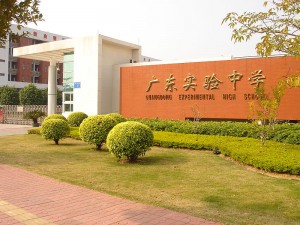As a global financial center, Hong Kong attracts a large number of expat families. For those with young children, education is a priority, but the city’s limited options can prove to be a headache.

Image courtesy of Wikimedia Commons under CC Attribution-Share Alike 3.0 Unported license and the GFDL. Image by Darrenxys.
In private international schools, tuition is often through the roof and admission highly competitive. Waiting lists are so long that in some cases parents are reportedly submitting applications along with ultrasound results of their soon-to-be-born children in the hopes of securing a spot when their son or daughter reaches school age.
In local schools, lack of Cantonese-language skills can keep expats from enrolling their children.
Malvern College, a leading British public school, recently announced that it is looking to launch its primary section in Tai Po, with over 90 percent of spots reserved for students holding foreign passports. If the school goes ahead with building its campus there, it will be the second famous British boarding school in the area, after Harrow International School in Tuen Mun, which opened in 2012.
But with only 1,104 km2 of land, Hong Kong does not have the space to build many new school facilities, and Malvern appears to be an exception to the rule. Most expats are left with the dilemma – local or international schools?
Expensive schooling
It takes a bit more than pocket change to pay the annual fees of the top international schools. Harrow International charges 136,500 Hong Kong dollars (17,610 US dollars), while other private schools charge about 79,500 Hong Kong dollars (10,200 US dollars). The Malvern School, which has yet to start, has fixed its yearly fees at 160,000 Hong Kong dollars (20,640 US dollars).
Schools also charge for applying for enrollment, up to a few thousand Hong Kong dollars for some schools. Local parent Fiona Kong commented on the forum Baby Kingdom: and allows his children to use it again.
To make sure [that the kids have] a good learning environment and enter a good primary school and develop fluent Chinese and English, parents are crazy. To be frank, now that my young daughter has to choose a secondary school, and I would rather cut short my lifespan for a few years in exchange if she managed to enter the one that we choose. I believe many parents share my feeling. Tell me, a few years of life or 2,800 Hong Kong dollars for buying hope, which one is more expensive?
Fees are bound to rise now that the Hong Kong government has decided to cut subsidies for schools run by the English Schools Foundation (ESF) starting in August 2016, increasing the burden on parents. In fact, the ESF increased fees for primary education by a whopping 5.9 percent in 2013 and has also revealed that in 2014 non-Chinese speaking children will not be given top priority for admission.
However, the international schools and the private institutions in Hong Kong have recently lost their appeal to the expat families.
The language barrier
In comparison, local public schools are free. Annual fees at Direct Subsidy Schools, which are private schools that receive support from the government, start from 7,370 Hong Kong dollars (950 US dollars) to nearly 60,000 Hong Kong dollars ($9,000 US dollars).
While a better deal financially, the majority of Hong Kongers speak Cantonese, and so it is the common language of instruction in many local schools, something that at times worries expat parents whose children don’t speak it. Kids are expected to be fluent in the language if they want to be enrolled in a local school.
Cara from the Asia Expat forum talked about her experience of sending her kids to local Cantonese-speaking kindergarten:
both of my kids attended a local kindergarten (my hubby is chinese, though). but their best friends, all non-chinese speakers, also attended the local kindie. now, they are all mostly at a local primary school […] so, yes, it is perfectly possible. just don’t expect your little one to understand everything immediately. it is a long process and the first few months will be the most difficult.
On the flip side, many international schools require children to be fluent in English. Maureen Anne called for help in the expat forum because her daughter cannot speak English:
My husband just accepted the offer to be expatriated to Hong Kong. Our family will also move there. We just realize how difficult it will be to find a suitable international school to our 5-year-old. All the 2014-2015 formal applications completed last Sept. More important, our daughter does not speak English. According to the agent who is assisting us to schools, all the good international schools will have English interview, they do not accept non-English speaker at all!
In an interview about relocation to Hong Kong, Alison Massey who is e-commerce director at Now Health advised other expats:
Getting a school place in Hong Kong is very tricky so any new arrival needs to get applications in as soon as possible, even if the children are not of school age yet.
This post was written by Expact Writer and was originally posted on GlobalVoicesOnline.org. It is republished under a Creative Commons license.
Tags: Civil society, Curriculum, Financing, Policy, Students, Teachers
